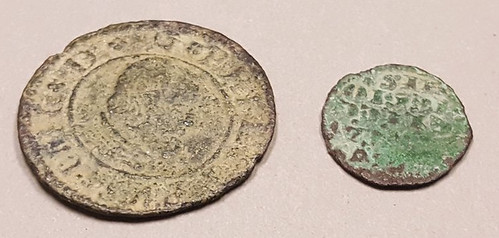
PREV ARTICLE
NEXT ARTICLE
FULL ISSUE
PREV FULL ISSUE
UTAH SPANISH COIN FIND: NEVERMINDHere's a follow-up from the Salt Lake Tribune about those old Spanish coins found in Utah. -Editor 
The recent discovery of two ancient Spanish coins near Halls Crossing excited archaeologists at Glen Canyon National Recreation Area, who wondered whether they offered evidence that Spanish explorers, possibly in search of mythical cities of gold, passed through Utah centuries ago. While the coins were determined to be authentic, National Park Service officials have now concluded that they were not left behind by Spaniards in colonial times. Circumstantial evidence, such as the 400-year difference in the two coins' ages, indicates they most likely came from a modern collection, but that finding raises other questions. Why would someone just throw away or lose valuable coins, dating back to the 13th and 17th centuries, in Utah canyon country? Yet the coins do tell two important stories. "First, the visitor who found the coins and turned them into the park showed great respect for the history and resources in the park and instead of keeping them, ensured everyone could learn about the coins," the park service wrote in a news release Tuesday. "Second, the coins' exact location and what they were found with has contributed to educated guesses about their history. This is why archaeological artifacts should be left in place and reported to the land management agency; where they are is just as important as what they are." The smaller of the two coins, called a dinero, was minted between 1252 and 1284, dating to the reign of Alfonso X. The larger coin is a "16 maravedis," dating from 1662 to 1664. The coins' mintings, four centuries apart, date to at least a century before the famous expedition of Atanasio Domínguez and Silvestre Vélez de Escalante, who crossed southern Utah in 1776. To read the complete article, see:
To read earlier E-Sylum articles, see:

Wayne Homren, Editor The Numismatic Bibliomania Society is a non-profit organization promoting numismatic literature. See our web site at coinbooks.org. To submit items for publication in The E-Sylum, write to the Editor at this address: whomren@gmail.com To subscribe go to: https://my.binhost.com/lists/listinfo/esylum All Rights Reserved. NBS Home Page Contact the NBS webmaster 
|